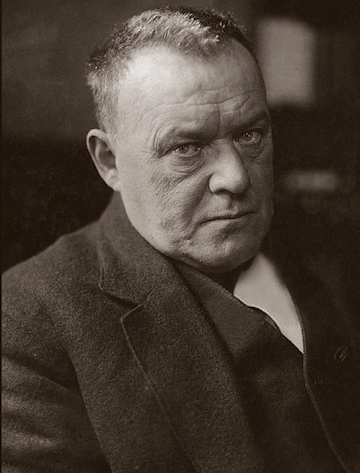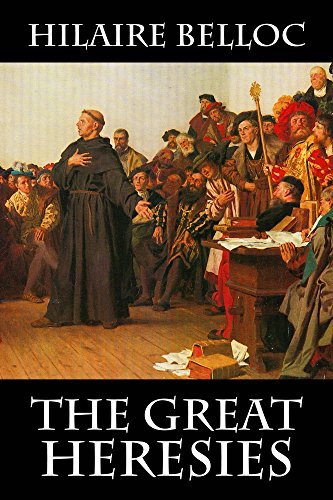My shock in finding The Great Heresies by Hilaire Belloc back in print should first be described. I’d been looking for a “hard copy” of this book for some years, in all the usual places (second-hand book stores and flea markets). I’d noticed that while still in the catalogue, it had been physically removed from at least one library, and “de-acquisitioned” by several others.
This was no surprise. The more important a book to our civilization, the quicker it disappears from the shelves today. Recently, for instance, I discovered that the whole classics section (Greek and Roman) had been eliminated from Toronto’s Central Reference Library, on grounds of “no public interest.” And then that the classics sections in several college libraries had shrunk to the point where I now had more standard texts in my little apartment.
We do not worry about this because we know that “everything” has been preserved in the electronic aether, and can be downloaded by any diligent searcher, usually for free. Precious few care for classics, fewer for the Fathers of the Church, and digital holdings are in their nature precarious. More fundamentally, as “studies” continue to show, the retention of material read on computer screens is approximately zero.
Ah well, as they say. And no wonder, it seems to me, that we have ignorant mobs attacking relics of the past, such as public statuary. It becomes much easier to animate these mobs because, in the absence of materials unread and unrespected, they will believe anything about the past they are told.
Now, Belloc was not a Greek or Roman, but his works as a historian are remarkable. A popular, as opposed to an academic historian, he was nevertheless so broadly and thoroughly educated – by travel and experience as well as by reading – that he opens vistas wherever he turns. And the intelligent reader is not restricted to Belloc, as Belloc perfectly knows. One is free to challenge him but, of course, that requires patience and enterprise.
I can date my search for a hard copy of The Great Heresies precisely, because it began on the 12th of September, 2001. It might have begun the day before, had I not then been a practitioner of daily journalism, and thus distracted from bibliographical interests by “breaking news.”
Alone among my countrymen it seemed – at least those employed in media – I was taken to know something about Islam. I did not consider myself any sort of expert, but anything would do under the circumstances, and for a moment I found myself welcome to fill as many column inches as I pleased.
People wanted to know what this “Islam” thing was all about, and what had been going on while they slept. I did my best to inform them – to get my facts straight and so forth – and was actually thanked by editors who had previously written me off as “some sort of conservative.”
This happy state lasted for weeks, until it was discovered that some things I wrote were not, so to say, “politically correct.” The U.S. invasion of Afghanistan was all very well, at first. But by Christmas of that year, those of the “progressive” persuasion had recovered their poise, and liberal apologists for Islam were in the journalistic ascendant.
I was particularly discouraged from writing about the fourteen centuries of history that lay behind this one particular strike out of the blue, redolent in so many ways of the seventh century. Even my initial explanation of the significance of the date “9/11” – 1683 – was now lost in the welter of alternative “experts,” who’d never heard of such things.
The victory of the Christian army under the Polish king, John III Sobieski – the defeat of the Ottomans at the gates of Vienna – had been among the most famous dates in history. Had that battle not been won, “the Infidel Turk” (as he was once called in Europe) would have been in a position to strike up the Danube into the heart of Western Europe. He was stopped as he had been at Lepanto, as his predecessors had been stopped by Charles Martel in the middle of France. History does actually turn on such great battles.
For Al Qaeda, openly committed to the restoration of a world-embracing Islamic Caliphate, the decisive reversal at Vienna was a source of terrible pain. It wasn’t, after all, their first siege across the Hungarian plains. The city had been their target for more than a century; as before it Constantinople (now Istanbul) had been their target, with attacks mounted annually towards it for centuries before it finally fell in 1453.
This long historical “clash of civilizations” was common knowledge, in both Muslim East and Christian West, until quite recently. Writing in 1938, Belloc surprised his readers by suggesting the clash was not over. He boldly predicted that Islam would recover, and the attacks would resume.
To a reader eighty years ago, Islam had been entirely defeated, by a victory of Western organization and technology. It was because, by analyzing it as a faith – indeed as an external Catholic heresy – that Belloc could appreciate its strengths. Moreover, it was by his analysis of the other great heresies that had riven and vitiated Christendom (the Arian, the Albigensian, the Protestant, the Modernist) that he could anticipate the “Islamist” revival.
His analysis, while in the extreme “politically incorrect,” is much subtler than the standard caricature; the five great heresies Belloc reviews were each unique in kind, and his comprehensive survey of their interaction is at an extraordinary intellectual level. We should not be distracted from the precision of his thinking by his enthralling and accessible prose.
The book is indeed so effective, that I was shocked to see it back in circulation. My first thought on spotting it was, “How was this allowed?” For the book has not dated. Only we have dated.















